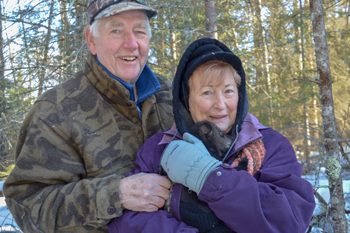Bernie Lemon (1936-2019) and
his wife, Mary, are honored as Conservation Heroes by friends  who have
witnessed their decades-long commitment to wildlife conservation in Wisconsin,
most notably their role in the reintroduction of elk in the state.
who have
witnessed their decades-long commitment to wildlife conservation in Wisconsin,
most notably their role in the reintroduction of elk in the state.
According to outdoor
journalist Paul Smith, Bernie
“was Wisconsin's No. 1 elk fan, a car salesman by day but wildlife supporter by
night who had a larger-than-life persona and a gift for poetry and
storytelling.” Born and raised in West
Allis, he apparently learned at an early age to dream big, claiming his first
big game hunt occurred as a child at the Milwaukee County Public Zoo where he “stalked”
the zoo’s moose.
Mary was Bernie’s life
partner of 62 years. They both were instrumental in the first Wisconsin chapter
of the Rocky Mountain Elk Foundation and, in the early 1990s began working with
friends and fellow conservationists to form the Elk Wisconsin group to raise
money for supporting the state’s elk reintroduction efforts. Based at Bernie’s
legendary Whisky Jack Camp – a cabin on Moose Lake near Hayward that Bernie built
and maintained with friends for more than five decades – the group raised about
$870,000 over the course of the decade. The
funding went mostly to UW-Stevens Point, which led the elk research study after
25 Michigan elk were released in 1995 near Clam Lake. The researchers, led by
professor Ray Anderson, needed vehicles, satellite transmitters, lodging and
more. The university conducted the elk
study from 1995 to 1999 when the management of the elk was formally transferred
to the Wisconsin DNR.
“Bernie Lemon was a national
conservation treasure,” said Christine Thomas, dean of the College of Natural
Resources at UW-Stevens Point. “His work
on the elk project will have long-term positive influences on our state.”
Smith wrote that Lemon’s life
“served as an example of how a humble volunteer, mostly working behind the
scenes, can form a team and provide wind beneath the wings of significant
wildlife projects. In so doing, he not
only helped bring a native species back to Wisconsin, but he established a
legacy of volunteerism that should inspire others.”
